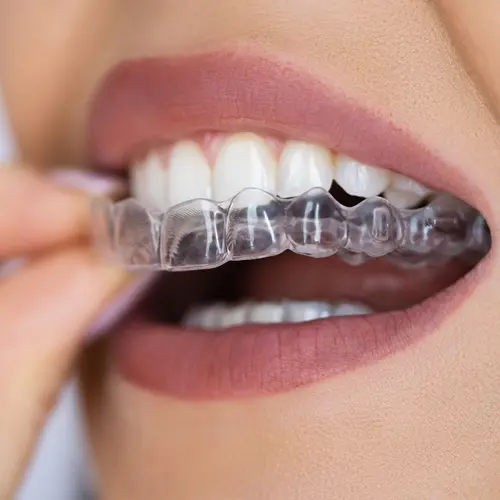Most people naturally breathe through their noses almost all the time. Humans evolved this way as a survival technique -- it keeps our breaths going as we eat with our mouths, so we don’t choke.
But some people develop mouth breathing later in life or are born as mouth breathers due to their body’s structural makeup. Both cases can make you unconsciously breathe through your mouth, which could lead to other health issues.
How to Tell If You’re Mouth Breathing
It can be hard to know if you breathe through your mouth, especially if it happens while you sleep. Signs you might be in the habit include:
- Dry mouth
- Snoring
- Bad breath
- Hoarseness
- Brain fog
- Feeling tired and irritable when you wake up
If this sounds like you, talk to your doctor. There’s not a simple test to diagnose it, but your medical team can do multiple exams to recognize if you breathe through your mouth.
To diagnose mouth breathing, your doctor -- usually an orthodontist -- will:
Do visual tests. They’ll look at how well your lips seal, if you have posture changes, dark eye circles, a long face, an open bite, a high narrow palate, or gingivitis (inflammation of the gum).
Do breathing tests. Your doctor will perform at least two out of the three tests: a graded mirror test, a water retention test, or a lip seal test.
Ask questions. They’ll also ask questions like: “Do you keep your mouth open when you are distracted?” or “Do you wake up with a headache?”
Your answers will help them find the cause of your condition and how to best treat it.
Causes of Mouth Breathing
Nasal obstruction (the partial or complete blockage of your nasal airways) is a common reason for mouth breathing. You may have a blocked nose from common things such as:
- Enlarged adenoids, which are the patches of tissue in the back of your throat and above your tonsils
- Nasal allergies
More rare causes include:
- Nasal polyps, which are growths of tissue in the lining of your nose
- Tumors
- Genetic abnormalities that affect your nose
Other conditions like sleep apnea can cause mouth breathing while you sleep. When a sleep apnea episode happens, you stop breathing. This makes your brain panic, which leads to a loud snore as your body suddenly gasps for air. These events can create a habit of mouth breathing so that your body gets enough oxygen.
Mouth Breathing vs. Nose Breathing
Experts agree that breathing through your nose has many more benefits than mouth breathing. Our noses process air differently than our mouths do. These differences are our body’s way of keeping us safe and healthy. When you breathe in through your nose, it:
Controls temperature. Your lungs prefer air that’s not too cold and not too hot. Unless you have a block, like a deviated septum or chronic rhinitis, your nose will warm or cool the air that goes into your lungs. This will help the air reach an ideal temperature for your body. Mouth breathing doesn’t do this.
Filters toxins. The small, hair-like structures called cilia in your nose filter out toxins and debris when you breathe. They help send them to your throat instead of your lungs. Mouth breathing directs everything you breathe into your lungs.
Humidifies. Your nasal passages humidify the air you inhale. Your mouth doesn’t typically do this, which is why some mouth breathers wake up with dry mouth or a sore throat.
Senses smell. Your nose can smell harmful substances in the air or your food. Your mouth can’t find these toxins as effectively.
The only time it’s absolutely necessary to breathe through your mouth is when you’re doing intense exercise or if your nose is blocked from congestion, a cold, or allergies. Temporary mouth breathing can help you get air to your lungs quicker in these situations.
Complications of Mouth Breathing
Breathing through your mouth can dry out your gums and the tissue that lines your mouth. This can change the natural bacteria in your mouth, leading to gum disease or tooth decay.
Over long periods of time, mouth breathing can also lead to physical changes in children, such as:
Mouth Breathing Treatment and Prevention
If the shape of your nose or face is the cause of your mouth breathing, you might not be able to treat it directly.
But if an underlying condition causes mouth breathing, your doctor will want to treat that first. Doing so might help you breathe through your nose better.
For example, you might need to take allergy medicine, or if you have sleep apnea, your doctor will suggest treatments based on how mild or severe your case is.
For moderate sleep apnea, your care team may recommend that you lose excess weight, avoid alcohol and certain sleeping pills, use special pillows, or take medication for sinus issues and congestion.
For more intense cases, you might need to wear a special mask over your nose or mouth while you sleep. This therapy, called continuous positive airway pressure (CPAP) therapy, gently pushes air through your nose or mouth to prevent your upper airway tissue from collapsing.
You can also try some preventative measures at home:
- Practice breathing in and out through your nose.
- Keep your nose clean.
- Reduce stress so you don’t gasp for air with your mouth.
- Use a larger pillow to prop your head up when you sleep.
- Exercise.
